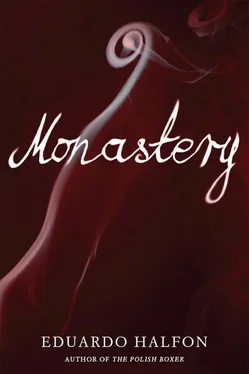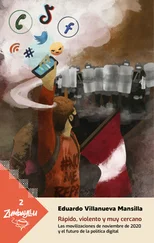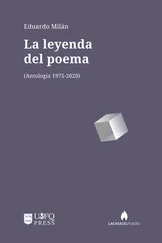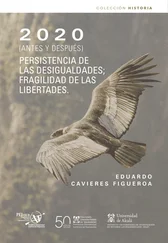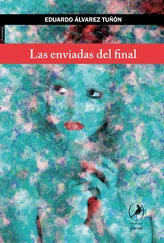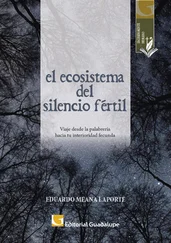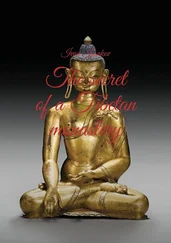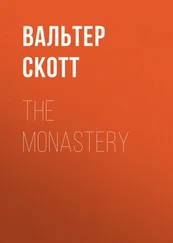More praise for Eduardo Halfon and The Polish Boxer

“Elegant.” — Marie Claire
“Engrossing.” — NBC Latino
“Fantastic. . Intense pain and beauty are offset by an unabashedly boyish sense of humor.” — NPR Alt.Latino
“Stimulating and inspiring.” — The Independent
“A mix of finely nuanced prose and humor.” — World Literature Today
“Beautiful and provocative. . a wonderful read which begs to be re-read.” — Jewish Book World
“A brave and touching and dead stylish examination of the nature of fiction, truth, and lies.” — Dazed & Confused
“[ The Polish Boxer ] exists in the no-man’s-land between fiction and memoir. In the end, we decide, this is fable: only the stories are important.” — The Guardian
“A professor mentors a student, gains wisdom from a Mark Twain scholar, and searches for a Gypsy musician, and that’s only part of the story in this incredible, achingly real yet enigmatic novel.” — San Francisco Chronicle, “Top Shelf” Recommendation from Bay Area independent bookstore Copperfield’s Books
“[Halfon] has succeeded in warping a modern Balkan mystery into a Holocaust memoir. . intrinsically blend[ing] fiction with reality in a deeply visceral way.” — The Rumpus
“A revelation. . The Polish Boxer is a book of small miracles. . For sheer narrative momentum and fascination with the mix of life and books, sex and art, there are echoes of the Chilean master Roberto Bolaño.” — Words Without Borders
“Halfon passionately and lyrically illustrates the significance of the journey and the beauty of true mystery. The Polish Boxer is sublime and arresting, and will linger with readers who will be sure to revisit it again and again.” — Booklist (starred review)
“These are the stories of life. . the question of survival (of both people and cultures) and the way the fictional makes the real bearable and intelligible.” — Publishers Weekly (boxed review)
“Brilliant. . opens with one of the best classroom scenes I’ve ever read.” — Shelf Awareness
“Highly readable and engaging. . provides readers food for thought about the nature of literary creations.” — Library Journal
“Eduardo Halfon’s prose is as delicate, precise, and ineffable as precocious art — a lighthouse that illuminates everything.” — Francisco Goldman, author of Say Her Name
“ The Polish Boxer is the most memorable new novel I have read all year — the voice pitch-perfect, the imagery indelible. What a wonderful writer.” — Norman Lebrecht, author of The Song of Names
“It is not often that one encounters such a mix of personal engagement and literary passion, or pain and tenderness.” — Andrés Neuman, author of Talking to Ourselves and Traveler of the Century
For my sister, for my brother
A cage went in search of a bird.
— FRANZ KAFKA
Tel Aviv was an inferno. I never figured out if Ben Gurion Airport simply didn’t have air conditioning or if it wasn’t working that day or if perhaps someone had decided not to turn it on so that we tourists would acclimate quickly to the sticky Mediterranean heat. My brother and I were standing, exhausted and bleary-eyed, waiting for our bags to come out. It was almost midnight and the airport no longer seemed like an airport. I was surprised to see that several other passengers, also awaiting their bags, lit up cigarettes, so I took one out myself and lit it and the acrid smoke immediately revived me a bit. My brother stole it from me. He let out a smoky sigh that conveyed both rage and indignation and swore under his breath as he wiped his T-shirt sleeve across his forehead. Neither of us wanted to be there, in Tel Aviv, in Israel.

OUR LITTLE SISTER HAD DECIDED to get married. She called us in Guatemala from a pay phone to say she’d met an Orthodox Jew from the United States, or actually that the rabbis at her yeshiva had introduced her to an Orthodox Jew from the United States, from New York, from Brooklyn, and that they’d decided — I never quite understood who, whether the rabbis or the two of them — that they should get married. My father snatched the phone away, shouted for a while, tried to dissuade her for another while, and then, resigned, asked or begged her to wait for us, saying we were on our way.
She’d been living in a women’s yeshiva in Jerusalem, studying the Torah and other rabbinical texts, for nearly two years. At first we all thought it was just a touch of Zion fever, or Hebrew fever, or some juvenile obsession with finding a deeper manifestation of our grandparents’ religion, and that it would eventually pass. But soon her discourse began to evolve. In letters, in phone calls, her words were no longer her own. Her language, as is always the case with the abruptly devout, became increasingly fierce and flippant, a sermon lacking any tolerance whatsoever. She legally changed her name to the Hebrew version. She began sending us photos in which she appeared — sometimes wearing a head scarf, sometimes a wig — covering up her lovely black curls: according to Orthodox Jewish laws and customs, she explained, a woman’s beauty is revealed in her hair, which is a temptation for men, and thus must be hidden. The same with women’s skin. My sister, young and beautiful, now wore only long baggy dresses that didn’t reveal her shoulders, or her neck, or her arms, and certainly not her legs. As though she were a prisoner of her own attire. As though temptation could actually be concealed beneath a baggy dress and a wig. I remember she came back to Guatemala only once during that time, for a visit. She warned us arrogantly that she could no longer touch any man when she greeted him; that she would prepare her own meals, using two sets of dishes she was bringing from Israel, one for dairy and one for meat; that during the twenty-four hours of Shabbat we were forbidden to drive, work, read, flush any toilets but one (whatever), or turn on any lights barring those that she had strategically left on since sundown the previous Friday and that had to remain on until sundown on Saturday. At some point, I recall, the five of us were sitting around the dining room table at my parents’ house, when my sister announced coldly that, as far as she and the Orthodox rabbis and teachers saw it, the four of us were not Jews. My father yelled once or twice. My mother stood and stormed off in tears, and my brother went after her. Well, I replied, at least that’s one thing we agree on.
THE BLACK LUGGAGE CAROUSEL still wasn’t moving. We’d been waiting for our bags for nearly an hour. Despite the fact that my brother groused every once in a while, none of the other passengers seemed particularly upset, or particularly surprised. Maybe because we all knew that security measures were tighter in Israel. Maybe because after so many hours in the air, you’re just thankful to no longer be crammed into two feet of plane.
Читать дальше
